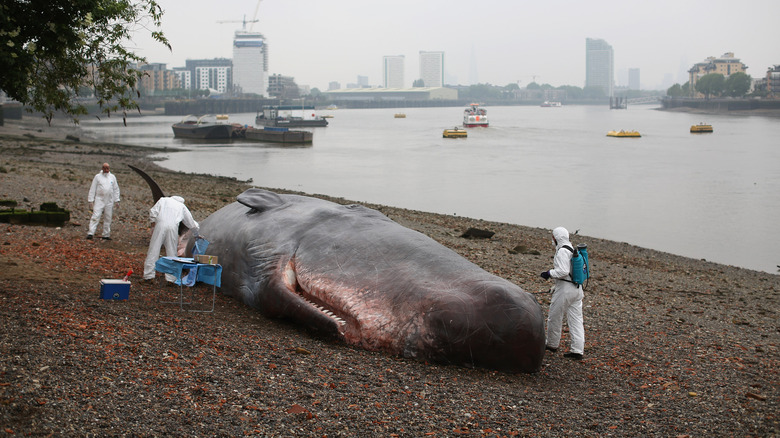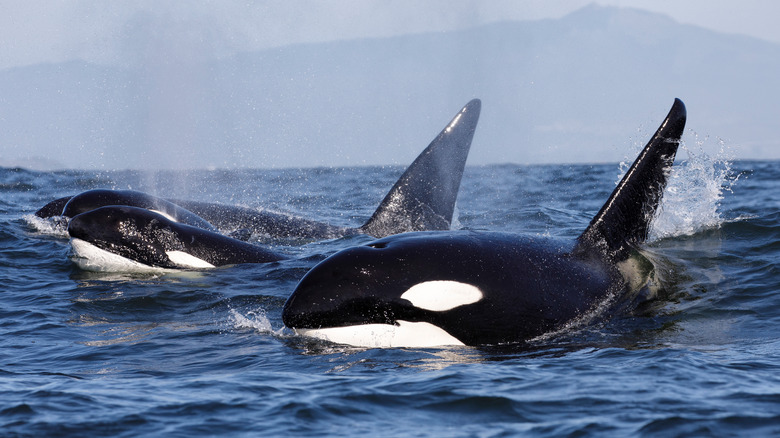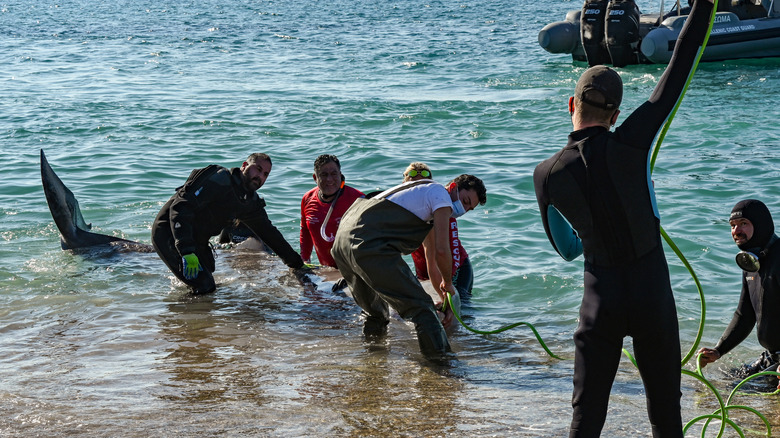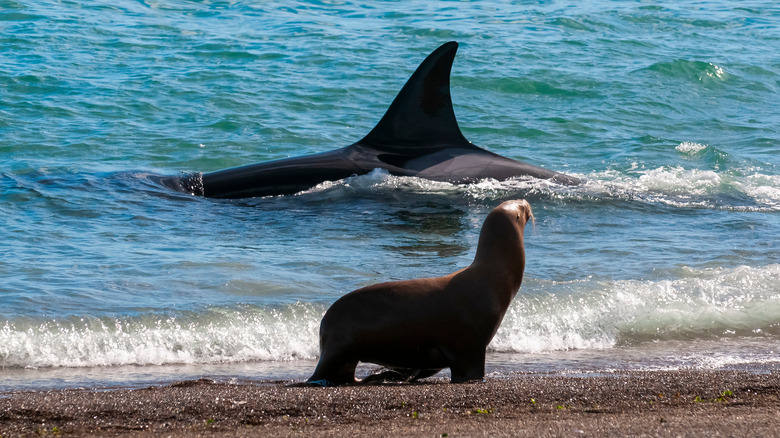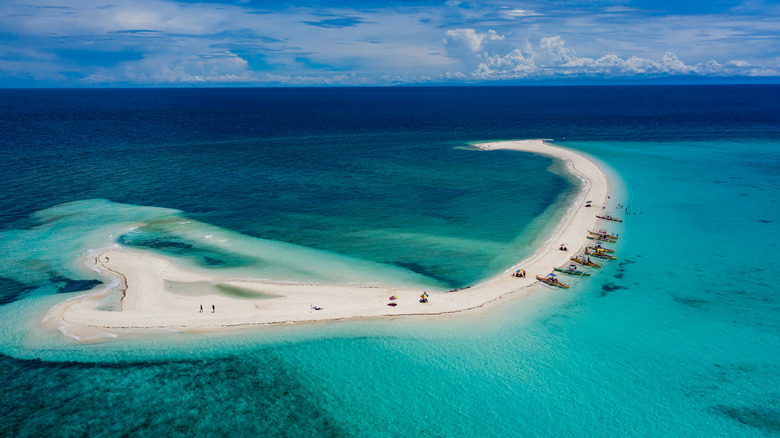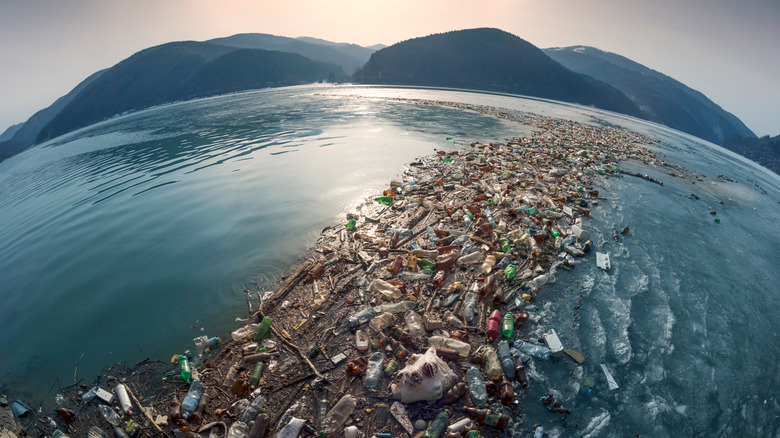What Research Has Shown About Why Whales Beach Themselves
The sandy shorelines often glisten with captivating finds that have washed up from the bordering ocean. From colorful shells and seaweed to the occasional jellyfish, the intersection of sea and land tells pieces of the ocean's story. This is usually a beautiful sight to see. But now and then, the ocean's story grows a bit noir, and we find the shoreline brimming with finds that are not exactly treasures.
One of the most heartbreaking things to see on a beach is undoubtedly a beached whale gasping for air. As these poor mammoth sea creatures lose water, they begin to overheat. If attempts to return a beached whale to the sea are unsuccessful or untimely, the whale will ultimately die ashore from dehydration or injuries. According to Science Focus, a beached whale can even drown if water from a high tide covers its blowhole. With consequences so dire, the inevitable question has to be asked: Why do whales beach themselves in the first place?
Whales breathe oxygen, but still can't survive on a beach
Life as a whale in the ocean is comparable to spending an entire lifetime on the swim team. Whales, like humans, breathe oxygen, which means they don't breathe underwater like most sea creatures. Whale and Dolphin Conservation reports that in order to survive, a whale must take in oxygen through the blowhole located at the top of its head while keeping the rest of its body submerged underwater, kind of like what you would do if you were swimming.
Life without gills poses unique challenges for whales, who do not take air and food from the same body part like most animals. Instead, they breathe through a nostril-like cavity atop their head while catching their prey with open mouths in the ocean (via Live Science). Some deep-diving whales can store oxygen, remaining underwater for hours at a time between breaths. But even they have to come up for air sometimes. Given the conditions, it might seem whales would beach themselves on purpose due to sheer exhaustion. If that was your guess, you're pretty close. Research shows some whale beachings actually are intentional. However, the whale's body isn't dynamic enough to withstand being ashore for an extended period of time, even if the oxygen it needs is in the air.
Sometimes whales beach themselves on purpose due to illness, injury, or even noise pollution
According to National Geographic, many beached whales drift ashore as illness or injury take hold. One study showed that the incident itself can also cause bodily harm. Following four years of research, scientists from the Marine Animals Rescue Coalition concluded that most beached whales suffered irreparable internal organ damage (via Independent).
Another factor that sometimes plays a role is old age, as life at sea becomes a laborious task for weary older whales who wash ashore. Drifting along the shallow shoreline for a bit enables these whales to store energy and alleviate the burden or strain that comes from the illness or injury (via Cape Clasp). However, that brief alleviation is short-lived if they are unable to return to the ocean depths.
Another less-referenced factor that can cause a whale to beach itself is noise pollution. When humans conduct active sonar surveys by sending sound ripples through the ocean and letting the echoes detect depth and distance, we sometimes do this at the expense of other sea creatures like whales (per Australian Government Department of Agriculture, Water, and the Environment). If noise pollution reaches the point where a whale finds it difficult to navigate via echolocation, which also requires sonar, that whale might seek refuge in the shoal. Sadly, those waters can become too shallow and that's how these sea creatures wind up on the sand.
Orca whales beach themselves to hunt
According to ABC News, not every beached whale is a victim of injury, old age, or even pollution. Some are just predators who have learned to hunt on land. This much is true for the orca, or killer whale. Research reveals that these 30-foot, six-ton sea mammoths have, on multiple occasions, hurled themselves out of the ocean to catch and kill beach-dwelling baby seals. Howard Rosenbaum of the Wildlife Conservation Society is in utter awe of the behavior, since it appears to be the result of intellect as opposed to instinct. "One of the most amazing things is that this is learned behavior. The whales actually teach each other how to do it," he explained.
Yet, even when orcas launch full-throttle from ocean to land, any miscalculations can be deadly (via National Geographic). So, while some whales do wind up on the beaches on purpose, their intention is never to get stranded, although many of them unfortunately do.
Tricky tide cycles or topography can lead to unintentional beaching
National Geographic reports that echolocation abilities can be disrupted even without the presence of noise pollution or human interference. Sometimes whales unwittingly move into shallow waters due to a shift in regional coastal topography, places where the water suddenly and unexpectedly becomes shallow.
Research suggests that certain regions are prone to mass beachings (an occurrence where multiple whales are beached at once) as a result of the natural topography in these ocean locations. Places notorious for such events include Cape Cod in the United States, New Zealand's Farewell Split, as well as the North Sea coastlines.
And while sudden shifts in topography can turn deep waters into shallow sandbars unexpectedly, tricky tides can be just as dangerous for whales. Research conducted via Project Jonah suggests that rapidly receding water in a tricky tide cycle can cause beaching as well. In this type of beaching, the whale miscalculates how quickly the tide will roll in or how shallow the water will become.
Overfishing and pollution can make beaching a desperate attempt at survival
Mass whale beachings continue to baffle scientists and sadden animal activists. Beaches covered in the decomposing, or occasionally exploding carcasses of whales (via Washington Post), are difficult to clean and nearly impossible to comprehend. This matter is even more pressing when we consider the human element in many whale strandings.
According to National Geographic, many of the above-listed reasons for beaching are likely still the result of humanity. For example, whales might beach themselves due to injury, but those injuries were the result of passing ships, fisherman's nets, or jagged bits tossed carelessly into the ocean by people. Even illnesses are frequently the result of chemical pollutants contaminating the ocean waters and the marine life habitat.
Research presented in 2019 by the U.K. Cetacean Strandings Investigation Programme and later reported by Science Focus exhibits a 15% increase in whale strandings in the U.K. alone. According to The Guardian, military sonar is being considered the main culprit behind these beachings. While research reveals a wide array of reasons whales beach themselves, many of these unfortunate events are linked to human interference. The silver lining here is that we know a bit about what causes sea creatures to strand themselves on the sand, and this information can be used toward future preventative efforts.
